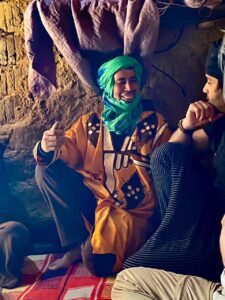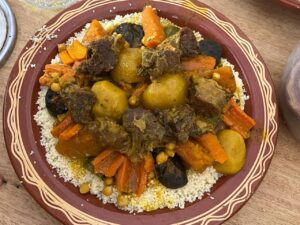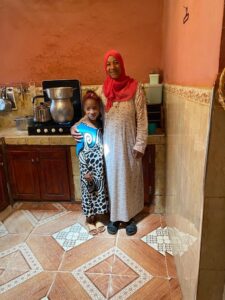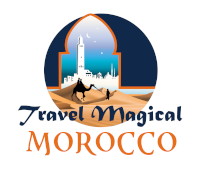If you’re ever lucky enough to be invited to someone’s home for a traditional meal in Morocco, consider yourself a truly privileged traveler. Hospitality runs deep in Moroccan culture, and an invitation to eat together is a sign of respect, trust, and warmth. But… how should you behave? What should you bring? What should you pay attention to? In this blog, we’ll tell you everything you need to know, so you can sit down at the table with peace of mind and a big smile.
Start at the beginning: greetings
 Upon entering, of course, you greet everyone. Usually with a warm smile, a handshake, and sometimes a light kiss on the cheeks—one or two, depending on the region. With women, it’s always a bit of a feel: women often give each other three kisses (left, right, left), but a man and woman sometimes only shake hands—or not even that, out of respect. It’s perfectly fine to wait and see what the other person does.
Upon entering, of course, you greet everyone. Usually with a warm smile, a handshake, and sometimes a light kiss on the cheeks—one or two, depending on the region. With women, it’s always a bit of a feel: women often give each other three kisses (left, right, left), but a man and woman sometimes only shake hands—or not even that, out of respect. It’s perfectly fine to wait and see what the other person does.
A greeting often comes with a string of well wishes: Salam alaikum (peace be upon you), labas? (how are you?), hamdoulilah (praise be to God). Don’t expect it to go quickly—greetings are a ritual in themselves, and a beautiful one to experience.
What should you bring?
You don’t need to bring expensive gifts to your hosts of a traditional meal in Morocco, but something small and thoughtful is deeply appreciated. Think of a beautiful scarf for the lady of the house, a pair of yellow babouches (leather slippers) for the gentleman, or—very traditional—a cone-shaped sugar loaf. Sugar symbolizes sweetness and prosperity and is a popular gift at festive occasions.
Flowers are less common in Morocco, especially outside the cities, so it’s better to skip them. And bringing alcohol—even with the best intentions—is generally a bad idea unless you’re absolutely certain it will be appreciated. In most cases: just don’t do it.
Shoes on or off?
Always take a look when entering: is there a carpet in the room? Then it’s customary to take off your shoes. No carpet? Then you can usually keep them on. Not sure? Just follow what others do. No one will think badly of you if you get it wrong—as long as your intentions are kind. It’s all very relaxed—politeness here lies in your attitude.
Eating: always with your right hand
 In Morocco, meals are often eaten by hand—and that means with the right hand. The left hand is traditionally seen as unclean (used for other things), so try to eat, take, and give with your right. Is it tricky? Feel free to ask for a spoon—especially if you’re not used to forming couscous balls with your fingers yet.
In Morocco, meals are often eaten by hand—and that means with the right hand. The left hand is traditionally seen as unclean (used for other things), so try to eat, take, and give with your right. Is it tricky? Feel free to ask for a spoon—especially if you’re not used to forming couscous balls with your fingers yet.
What’s on the table? Likely several courses, often starting with salad, then a tajine or couscous, sometimes another meat dish, and always plenty of bread to eat with. Sometimes topped off with fresh fruit as desert. Everything is typically served on one large platter to be shared. You eat from the section right in front of you—not from the middle or someone else’s part.
Washing hands before eating
Before a traditional meal in Morocco, there’s often a ritual: washing hands. Sometimes there’s a beautiful metal jug—a kind of samovar—with warm water and a basin underneath. Someone will pour the water over your hands while you wash them. Sometimes no soap—just a ritual cleansing. Afterward, you’ll be handed a towel. It’s a beautiful moment of literal and symbolic purification.
Be a good guest – and take your time
 In Morocco, hospitality is sacred. It’s not just a polite gesture—it’s a core value of society. Inviting someone into your home means accepting them into your circle of trust. Hosting guests is considered an honor—so your respectful behavior as a guest is deeply appreciated in return.
In Morocco, hospitality is sacred. It’s not just a polite gesture—it’s a core value of society. Inviting someone into your home means accepting them into your circle of trust. Hosting guests is considered an honor—so your respectful behavior as a guest is deeply appreciated in return.
This begins the moment you arrive. Being on time is polite, but it doesn’t mean “Dutch punctuality.” Arriving five to ten minutes late is often perfect. Being early—before the host is ready—can be awkward. But more important than when you arrive is how you spend your time.
Because in Morocco, you take time for each other. A traditional meal in Morocco is not a rushed task, but a moment of connection. You sit, eat slowly, talk, laugh, listen. You are present. No one checks their watch or worries about the next appointment. And if, after eating, you immediately stand up to leave? That feels distant. Taking your time—even after the meal—is a form of respect. There might be tea served, or some chatting on the balcony. When you leave space, the best conversations often arise.
It’s also deeply appreciated when you notice what’s happening around you: the care with which the meal was prepared, the atmosphere, the little gestures. Show that you value it. A compliment about the tajine or couscous works wonders. People also appreciate it when you show interest in the family, customs, or simply ask for the recipe of that delicious mint tea.
And if something is offered to you—even if you’re completely full—accepting just a small bit is polite. Saying “no” is fine, but do it with a smile and a kind gesture. Modesty and gratitude are the key traits of a good guest—and you’ll find they’re met with deep respect.
After lunch? A little nap is okay
What you might not expect: after a big lunch, it’s common to rest for a bit. The couches you just ate on easily turn into lounging spots. It’s not at all strange to take a short nap after the meal—especially on warm days. As a guest, you’re not expected to start snoring, but if you’re invited to rest, feel free to say yes.
Finally: enjoy!
Moroccan hospitality is heartwarming. You don’t have to be perfect or know all the customs. If you come with respect and curiosity, you’ll be welcomed with open arms. Ask questions, smile often, and let yourself be surprised by the flavors, scents, and stories at the table. Before you know it, you won’t feel like a tourist anymore—but like part of the family.
Want to experience a traditional meal in Morocco and the Moroccan hospitality yourself?
At Travel Magical Morocco, we love to take you beyond the tourist trail—straight to the heart of Moroccan culture. Our trips are personal, small-scale, and tailor-made. And would you like to experience such a traditional meal with a local family yourself? Let us know—we’ll be happy to see if we can arrange it for you.
Whether you’re traveling with your family, friends, or as a couple: Morocco has a seat at the table for everyone. Discover the real Morocco—warm, generous, and full of stories.
👉 Check out our trips at www.travel-magical-morocco.com or contact us directly for a personal travel proposal of you want to enjoy a traditional meal in Morocco yourself.
